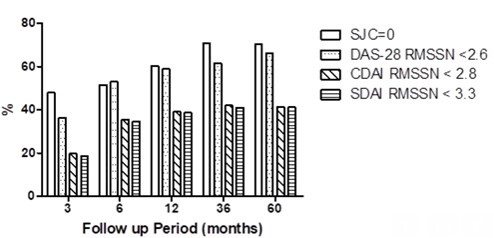Session Information
Date: Sunday, November 12, 2023
Title: (0380–0422) RA – Diagnosis, Manifestations, and Outcomes Poster I
Session Type: Poster Session A
Session Time: 9:00AM-11:00AM
Background/Purpose: Rheumatoid Arthritis is a chronic autoimmune disease characterized by persistent joint inflammation. According to international guidelines, the treatment target should aim to reach the remission state or at least the low disease activity (LDA), evaluated through the disease activity score, including DAS28, CDAI, and SDAI. All the disease activity composite scores include the swollen joint count (SJC) as the main clinical evaluation. Following this, the ACR/EULAR Boolean criteria were validated with a SJC >1. To the best of our knowledge, no studies have been addressed in the evaluation of no SJC and is association with the other response criteria. The aim of the study is to determine which baseline variables are associated with achieving and maintaining a zero SJC.
Methods: We enrolled RA patients included in the ERA UCLouvain Brussels cohort naïve to DMARDs therapy according to the ACR/EULAR 2010 criteria. Each patient had a complete rheumatological evaluation at baseline and up to 60 months of follow-up. The patient’s characteristics including clinical and serological features were collected. The association between swelling, bone erosion, and clinical and disease characteristics was analyzed, aiming at identifying any variables associated with the reaching of SJC=0.
Results: We enrolled 455 RA patients (Male/Female 29.5%/70.5%, medium age 48.8±14.7. At baseline, the mean SJC was 8.70 ±7.44, the mean DAS28 was 4.76±1.38, Age 48.8±14.7, ACPA and RF prevalence was 68.9% and 64.7% respectively. Bone erosions were identified in 45.5% of patients. In figure 1. are reported the percentage of patients reaching a SJC=0 and remission status according to DAS28, CDAI, and SDAI definitions up to 5 years of follow-up. In our cohort at 3 and 6 months, respectively 37.2%, 21.3%, 22.2% and 39.3%, 28.5%, 27.7% of the patients fulfilling DAS28, CDAI or SDAI remission presented at least one SJC. Among all the baseline analyzed features, Baseline Erosion was the strongest predictor of at least one SJ from baseline to 5 years of follow-up: (3 months: 36.2% versus 54.1%; p< 0.001; 6 months: 36.7% versus 54.9%; p< 0.001; 12 months: 39.3% versus 55%; p=0.034; 36 months:43.9% versus 56.2%; p=0.045; 60 months: 47.1% versus 62.8%; p=0.019). Smokers had a lower chance to reach a SJC count at three months (20.8% versus 29.7%; p=0.042), and the female sex had the same association at 60 months of follow-up (65.8% versus 78.2%; p=0.0019). Focusing on long-time follow-up (5 years), including only MTX-treated patients (n=141), the group of subjects who never reached a SJC=0 were characterized by a higher baseline age (52.1±15.7 versus 46.7±15.5; p=0,150), DAS28 (5.08 ±1.38 versus 4.04±1.16; p=0.001), RF prevalence (81.5% versus 62.7%; p=0.08) and baseline erosions (77.8% versus 36.7%; p=0.0004).
Conclusion: We identified an association between baseline disease features and the chance of not reaching a SJC of zero, suggesting how smoking, presence of RF, and baseline erosion may identify a group of patients with clinically persistent joint inflammation, whit a greater risk of not reaching remission. We confirm also that the resolution of SJC is a good practical end point in ERA.
To cite this abstract in AMA style:
Natalucci F, triaille c, Sapart E, BRICMAN L, VAN MULLEM C, Desmet C, DIERCKX S, DOYEN M, Sokolova T, AVRAMOVSKA A, Durez P. Resolution of Swollen Joint Count Is an Important Clinical Objective in Early Rheumatoid Arthritis : Analysis of the UCLouvain Brussels ERA Cohort and Comparison with the Remission Composite Index [abstract]. Arthritis Rheumatol. 2023; 75 (suppl 9). https://acrabstracts.org/abstract/resolution-of-swollen-joint-count-is-an-important-clinical-objective-in-early-rheumatoid-arthritis-analysis-of-the-uclouvain-brussels-era-cohort-and-comparison-with-the-remission-composite-index/. Accessed .« Back to ACR Convergence 2023
ACR Meeting Abstracts - https://acrabstracts.org/abstract/resolution-of-swollen-joint-count-is-an-important-clinical-objective-in-early-rheumatoid-arthritis-analysis-of-the-uclouvain-brussels-era-cohort-and-comparison-with-the-remission-composite-index/

